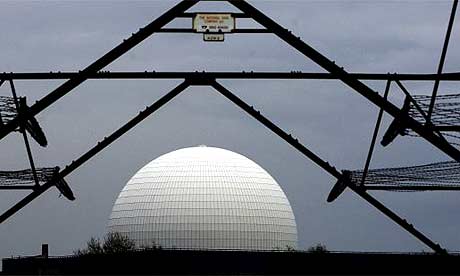
Plastic bags are much in the news. Gordon Brown announced he'll back a move to charge people for them, so that we'll use fewer. Clearly, nobody has pointed out to him that they're made from naphtha, a byproduct of oil refining for which no other use has been found. If nobody makes plastic bags any more, it'll get burnt off - generating more carbon dioxide. Well done, Gordon, and Paul Dacre of the Daily Mail! You've boosted climate change!
There's much rubbish spouted about biofuels; it turns out they displace crops that could be used for food. But it's all about the climate, isn't it?
Now, imagine that some enterprising company invented a system to trap all the carbon dioxide output from the UK's power stations and compress it into a condensate for disposal. This material would be lethal: fill a room with carbon dioxide and you'll die very quickly. If it escaped, the effect on the climate would be woeful.
Obviously, it would be a popular technology that could be sold abroad, but taking care of that waste - in 2005, UK power stations emitted 173m tonnes of CO2 (tinyurl.com/2m4ow3) - would be hard. You'd need confidence it was being kept safe.
Of course, it wouldn't solve the problem of rising oil, gas and coal prices. You thought last winter's rises were unpleasant? Wait for oil to reach $200 (£100) per barrel (and gas and coal prices to stay roughly in line) in the coming years, while the UK's dependence on imported energy keeps growing. (In 2006, the UK ceased being an oil exporter.)
Alternatively, rather than trying to dream up new technologies to capture carbon dioxide, use a technology we've already got: nuclear power. It's just like our CO2 capture scenario: the output is very toxic, and needs careful marshalling. But it's well-understood. The fuel is plentiful, and unlike oil and coal, doesn't contribute to climate change.
Sure, backing nuclear power is an unusual stance to take in this paper. But renewables - wind, wave, sun - cannot ever meet our growing electricity demand, which is rising by 1% annually. And while fossil fuels constitute the majority of our electricity generation, your electricity bill will rise relentlessly. Green groups don't like nuclear power because of the waste issue. But the waste from burning oil is far more potent.
Going totally nuclear means we can rely on energy generated within the UK, and meet our requirements to cut CO2 emissions by 2020. Sure, disposing of nuclear waste is difficult and has to be done for the long term. The only difference from CO2 is that it's easier to see nuclear waste. They're both, in the end, deadly; at least the nuclear waste is concentrated.
Every generation faces a huge challenge that it must overcome; in the 20th century there was the rise of fascism, and then the threat of global destruction by nuclear weapons. Now it's climate change. The irony is that the technology involved in all three is the same. Once again it needs to be applied to assure a future peace.
It's time for the government to stop frittering with irrelevancies like low-energy light bulbs and urging us to switch off standby equipment. It's fiddling at the edge of a vast, but not intractable, problem. If you like your lifestyle, realise that preserving it in the future will demand a lot of nuclear generating capacity. Yes, it's expensive. But so was that bank the government is now spending billions propping up.
If the government were truly serious about the environment, Gordon Brown wouldn't have bothered with the Daily Mail's plastic bags initiative. He'd have announced a Northern Rock-sized investment in new nuclear power stations to provide 100% of the UK's forecast energy needs by 2020. If a bank holds all our futures so much that it needs government support, doesn't energy?
charles.arthur@theguardian.com

